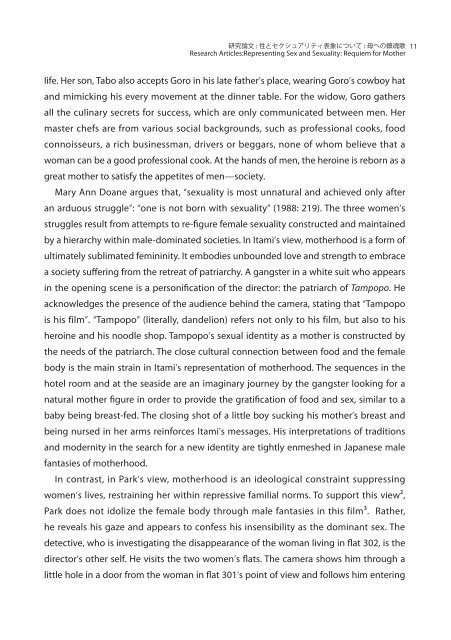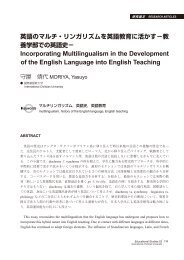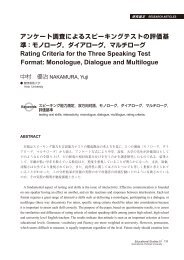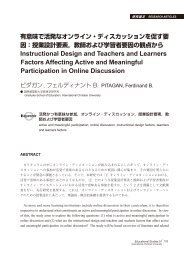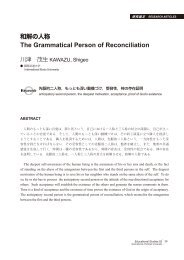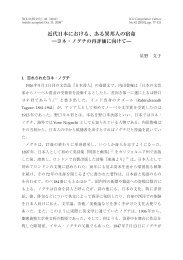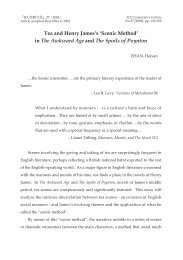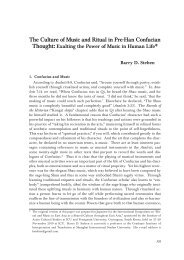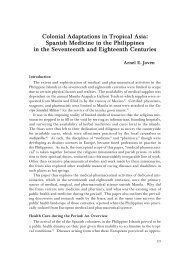Untitled - subsite - å½éåºç£æ大å¦
Untitled - subsite - å½éåºç£æ大å¦
Untitled - subsite - å½éåºç£æ大å¦
Create successful ePaper yourself
Turn your PDF publications into a flip-book with our unique Google optimized e-Paper software.
: : 11<br />
Research Articles:Representing Sex and Sexuality: Requiem for Mother<br />
life. Her son, Tabo also accepts Goro in his late fathers place, wearing Goros cowboy hat<br />
and mimicking his every movement at the dinner table. For the widow, Goro gathers<br />
all the culinary secrets for success, which are only communicated between men. Her<br />
master chefs are from various social backgrounds, such as professional cooks, food<br />
connoisseurs, a rich businessman, drivers or beggars, none of whom believe that a<br />
woman can be a good professional cook. At the hands of men, the heroine is reborn as a<br />
great mother to satisfy the appetites of mensociety.<br />
Mary Ann Doane argues that, sexuality is most unnatural and achieved only after<br />
an arduous struggle: one is not born with sexuality (1988: 219). The three womens<br />
struggles result from attempts to re-figure female sexuality constructed and maintained<br />
by a hierarchy within male-dominated societies. In Itamis view, motherhood is a form of<br />
ultimately sublimated femininity. It embodies unbounded love and strength to embrace<br />
a society suffering from the retreat of patriarchy. A gangster in a white suit who appears<br />
in the opening scene is a personification of the director: the patriarch of Tampopo. He<br />
acknowledges the presence of the audience behind the camera, stating that Tampopo<br />
is his film. Tampopo (literally, dandelion) refers not only to his film, but also to his<br />
heroine and his noodle shop. Tampopos sexual identity as a mother is constructed by<br />
the needs of the patriarch. The close cultural connection between food and the female<br />
body is the main strain in Itamis representation of motherhood. The sequences in the<br />
hotel room and at the seaside are an imaginary journey by the gangster looking for a<br />
natural mother figure in order to provide the gratification of food and sex, similar to a<br />
baby being breast-fed. The closing shot of a little boy sucking his mothers breast and<br />
being nursed in her arms reinforces Itamis messages. His interpretations of traditions<br />
and modernity in the search for a new identity are tightly enmeshed in Japanese male<br />
fantasies of motherhood.<br />
In contrast, in Parks view, motherhood is an ideological constraint suppressing<br />
womens lives, restraining her within repressive familial norms. To support this view²,<br />
Park does not idolize the female body through male fantasies in this film³. Rather,<br />
he reveals his gaze and appears to confess his insensibility as the dominant sex. The<br />
detective, who is investigating the disappearance of the woman living in flat 302, is the<br />
directors other self. He visits the two womens flats. The camera shows him through a<br />
little hole in a door from the woman in flat 301s point of view and follows him entering


